From the tragic death of prominent lawyer U Ko Ni to the worst disaster in the country’s aviation history, an H1N1 outbreak, and the latest deadly attacks in Rakhine State, 2017 has been a troubled year for Myanmar. Here, The Irrawaddy takes a look back at significant events throughout the year.
January
Jan. 16 — The Yangon Bus Service launched with 70 routes and more than 3,700 buses, replacing the Yangon Motor Vehicles Supervisory Committee, or Ma Hta Tha, which was more than 50 years old.
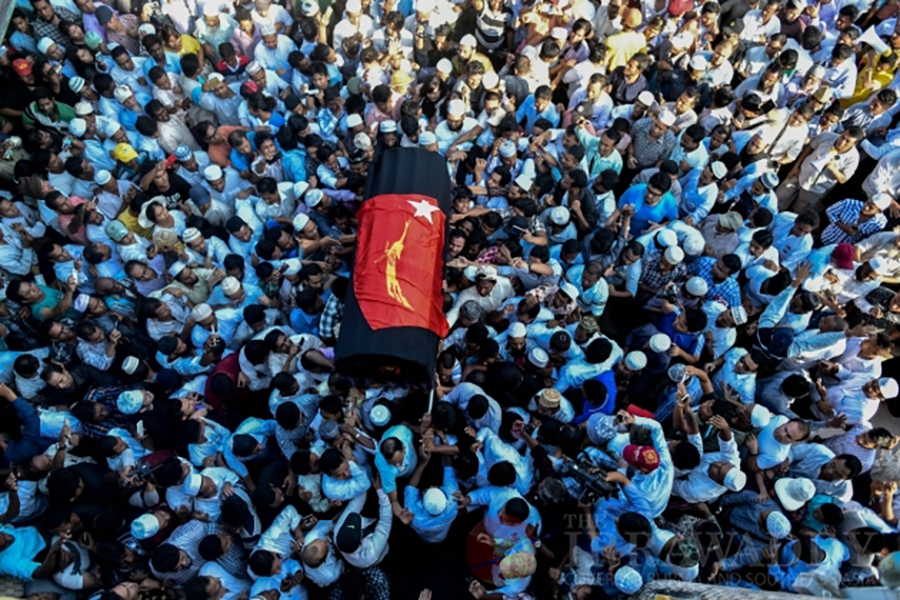
Jan. 29 — Prominent lawyer and NLD legal adviser U Ko Ni was shot dead at close range outside Yangon International Airport. Taxi drivers at the scene managed to catch the gunman, Kyi Lin, but one of them, U Ne Win, was killed in the chase.
The assassination shocked the nation. It was later revealed that former military officers were involved. Though most of the suspects were eventually arrested, the suspected mastermind, retired Lieutenant General Aung Win Khine, was spotted afterward in Naypyitaw but remains at large.
February
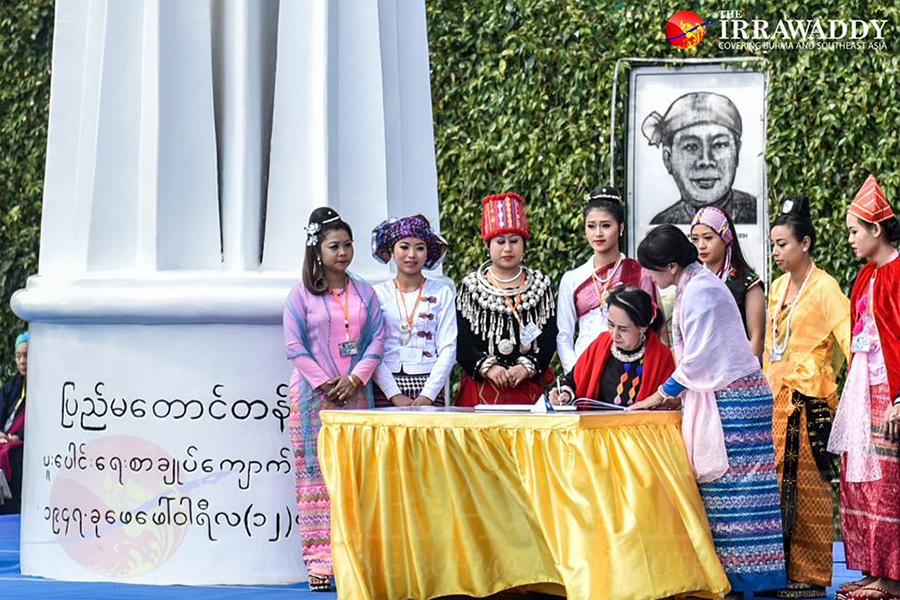
Feb. 12 — The 70th Anniversary of Union Day was held in the town of Panglong in Shan State. During the ceremony, State Counselor Daw Aung San Suu Kyi joined peace talks with ethnic people beside the Panglong monument. She urged non-signatories to the Nationwide Ceasefire Agreement (NCA) to join the upcoming 21st Century Panglong Conference.
Family members of 23 ethnic representatives who signed the historic Panglong Agreement in 1947 with Daw Aung San Suu Kyi’s father, General Aung San, also attended the anniversary and expressed their support for the coming conference, which Daw Aung San Suu Kyi will lead.
March
Mar. 6 — Eleven civilians including a teacher were killed in an attack by members of the ethnic Kokang Myanmar National Democratic Alliance Army on residential houses and police stations in Laukkai, the administrative capital of Shan State’s Kokang region. Daw Aung San Suu Kyi, chairwoman of the National Reconciliation and Peace Center, issued a statement calling for an end to armed clashes and the beginning of peace negotiations.
Mar. 10 — State Sangha authority Ma Ha Na banned ultranationalist Buddhist Monk U Wirathu from delivering sermons across the country for one year because of his religious hate speech.
Mar. 14 — The Lower House voted to name a bridge across the Salween River in Mon State’s Chaungzon Township after Myanmar’s independence hero General Aung San despite objections from ethnic Mon locals who wanted a name that would reflect their ethnic identity.
Mar. 24 — The Ministry of Foreign Affairs objected to a UN resolution calling for the dispatch of an international fact-finding mission to Myanmar to investigate the crisis in Rakhine State. “The establishment of an international fact-finding mission would do more to inflame rather than resolve the issues at this time,” the ministry said in a statement.
Mar. 28 — Daw Aung San Suu Kyi, for the first time since her government took office, visited camps for internally displaced persons (IDPs) in Myitkyina and Waingmaw on an official visit to Kachin State, where she met with Kachin religious leaders and civil society groups.
She urged the Kachin State government to create jobs for IDPs and asked Kachin leaders to urge the Kachin Independence Army to sign the NCA.
April
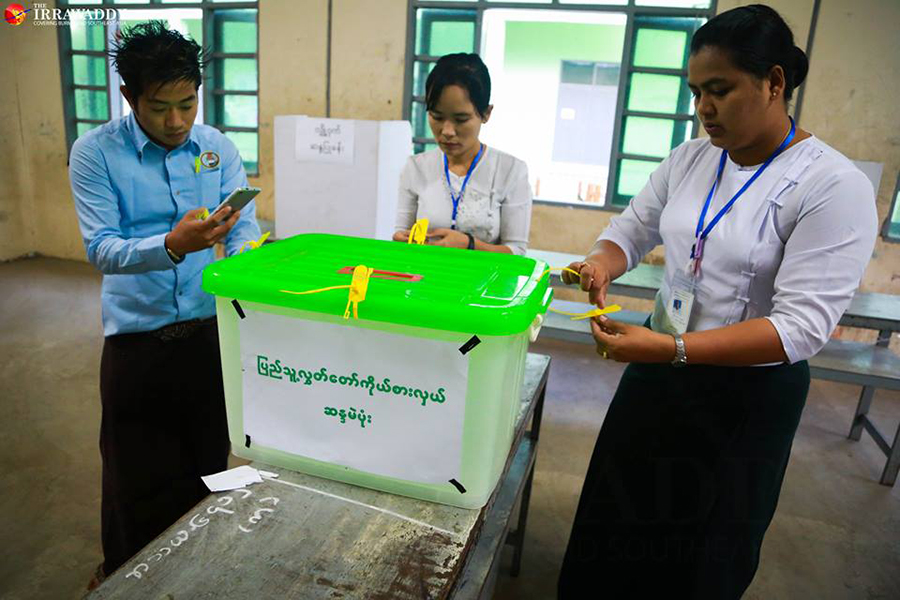
April 1 — By-elections were held for 19 vacant constituencies. The ruling NLD won only nine seats and lost most of the races in heavily ethnic areas including in Shan, Rakhine, Mon and Karenni states.
The USDP beat the NLD to win a Lower House seat in Mon State’s Chaungzon Township after months of controversy there over the naming of a bridge.
April 7 — Approximately 30 people died after a ferry with 70 people on board capsized on the Ngawun River in Irrawaddy Region after colliding with a boat carrying gravel.
April 25 — The Union government ordered former Magwe Region Chief Minister U Phone Maw Shwe to return missing funds after an investigation found that he had embezzled some 7.5 billion kyats ($5.5 million), which he collected in taxes from small-scale oil producers and earmarked for regional development projects.
U Phone Maw Shwe has since paid back over 3 billion kyats. The Magwe Regional Auditor-General’s Office is investigating whether the other 4 billion kyats was actually allocated to development projects.
April 28 — Two madrasas in Yangon’s Thaketa Townshhip were sealed off by a Buddhist nationalist group that alleged the Islamic schools were operating as mosques without official permission.
May
May 5 — The Tatmadaw condemned senior NLD member U Win Htein for saying that the military was among those who have been involved in spreading false rumors circulating on social media claiming that President U Htin Kyaw had resigned.
In a statement, the military said “the groundless reply based on suspicion seriously harms the military’s dignity” and “could harm national unity, especially during a time when the government is committed to national reconciliation.” The military said it would “make the necessary responses.”U Win Htein later claimed that his comment was a slip of the tongue.
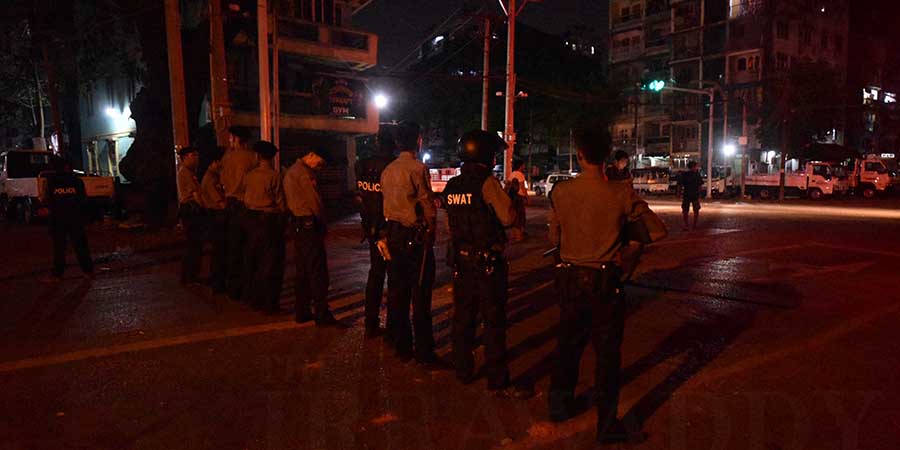
May 9 — Police fired two warning shots to break up a confrontation between Buddhist nationalists and Muslims in Yangon’s Mingalar Taung Nyunt Township. Buddhist monks led nationalists into the Muslim neighborhood before midnight, claiming Muslim Rohingya were staying there illegally. The police arrested seven people, including two monks.
May 20 — More than 4,000 Buddhist monks and nationalists — including members of the Patriotic Myanmar Monks Union from Yangon, Bago, Irrawaddy regions and Karen and Mon states — staged a protest against Religious Affairs Minister Thura U Aung Ko for his alleged failure to protect Buddhism. The protesters were demanding his resignation and the repeal of a ban prohibiting U Wirathu from delivering sermons.
May 23 — The Ma Ha Na banned Myanmar’s largest religious nationalist group, Ma Ba Tha, from operating under its current name and ordered that its signboards be taken down across the country by July. Ma Ba Tha responded by rebranding itself as the Buddha Dhamma Charity Foundation, though some of its chapters in Mandalay Region and Karen State have defied the order.
May 24 — The second session of the 21st Century Panglong Union Peace Conference was held in Naypyitaw over six days. During the closing ceremony, Daw Aung San Suu Kyi said agreements reached at the conference marked a significant step forward on the path to peace, national reconciliation and the emergence of a democratic federal Union. On the eve of the event, 259 prisoners, including former Religious Affairs Minister U Hsan Hsint, were released from jail to mark the conference.
June
June 2 — Police detained The Voice Daily Chief Editor U Kyaw Min Swe and satirist British Ko Ko Maung after an official with the Tatmadaw’s Yangon Region Command brought charges against the two for publishing an article in March that satirized the country’s civil war and peace process.
The pair faced charges under Article 66 (d) of the Telecommunications Law and Section 25 (b) of the Media Law. The army dropped the charges on Sept. 1.
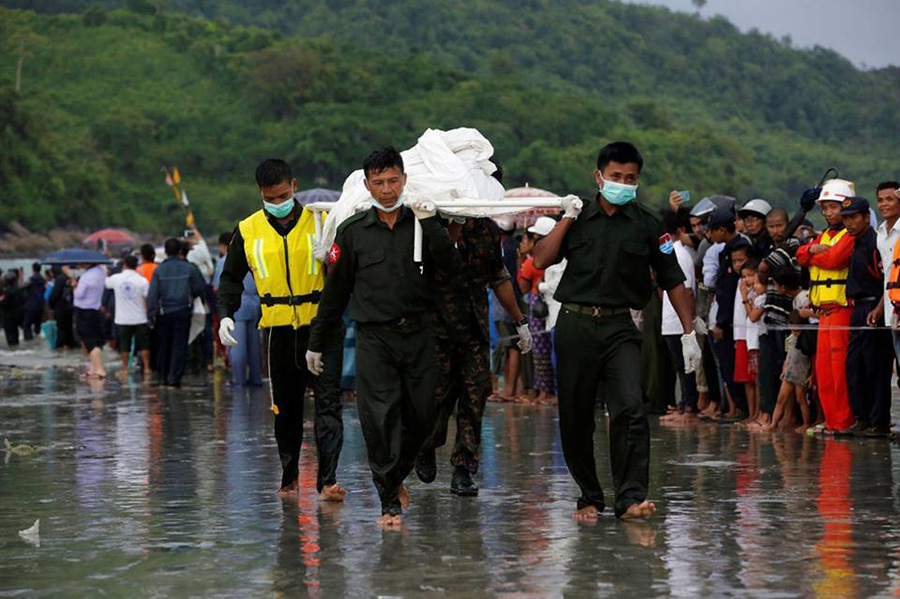
June 7 — A Chinese-made military transport plane with 122 soldiers, family members and crew on board flying from Myeik to Yangon crashed into the Andaman Sea. The military concluded that the crash occurred because of bad weather. There were no survivors.
June 20 — Yangon South District Court sentenced a witch doctor to seven years in jail and to be hanged for beating three children to death in a purported exorcism ritual in Twante Township, outside Yangon City.
June 26 — A senior reporter for The Irrawaddy and two reporters for the Democratic Voice of Burma were arrested by the Myanmar Army on their way back from a reporting trip to an area of northern Shan State controlled by the Ta’ang National Liberation Army to cover a ceremony marking a UN-designated day against drug abuse. The military filed its lawsuit against the journalists under Article 17 (1) of the Unlawful Associations Act. After detaining the journalists for more than two months, the military withdrew its case against them on Sept. 1.
July
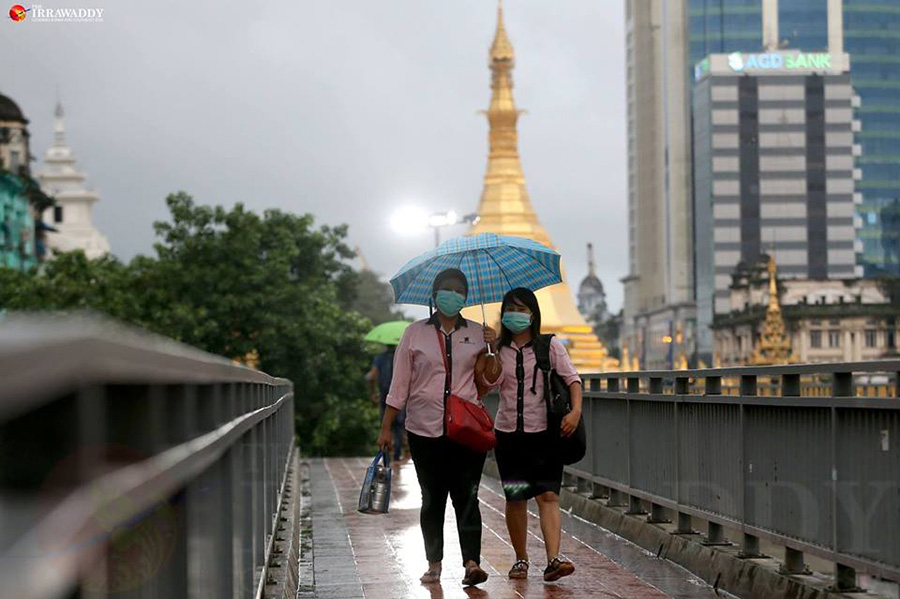
July — Myanmar was rocked by a seasonal H1N1 influenza scare throughout July and August and forced to seek help from the World Health Organization. The death toll continued to rise until the second week of August. Approximately 400 cases and 38 deaths were recorded in all.
At the same time, H5N1 avian flu cases were reported in Tanintharyi Region’s Dawei Township and Yangon Region’s Mayangone Township.
July 7 — Ten people were killed and more than 30 were injured when two YBS buses collided on Pyay Road in Mingaladon Township in Yangon’s deadliest ever road accident.
July 30 — Myanmar Now Chief Editor Ko Swe Win was arrested at Yangon International Airport on his way to Bangkok for a short work trip ahead of a scheduled court hearing in Myanmar.
He had two related cases filed against him nationalists for insulting U Wirathu by sharing a Myanmar Now news story quoting a senior abbot who said U Wirathu was no longer in the monkhood because he had praised the assassins who killed NLD legal adviser U Ko Ni in January. Ko Swe Win was released on bail the next day and the case filed in Yangon was dropped.
August
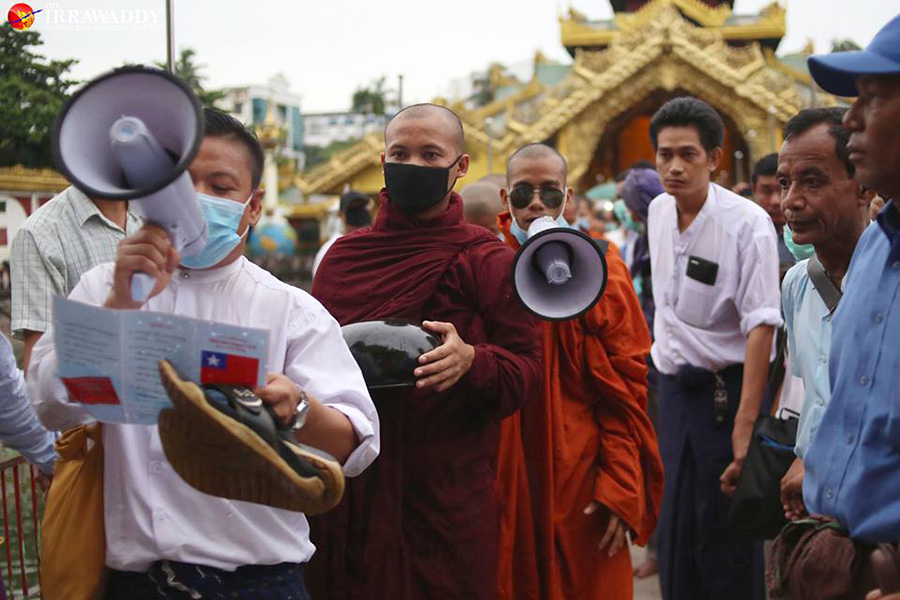
Aug. 2 — Hundreds of nationalist monks and laymen staged sit-in protests near the Shwedagon Pagoda in Yangon and the Maha Muni Pagoda in Mandalay, accusing the NLD-led government of failing to protect Buddhism and Buddhists and calling on it to step down.
Far from attracting broad support, the protesters’ calls elicited public condemnation and their numbers quickly dwindled to few more than a dozen. After the government’s crackdown on a protest camp in Mandalay, protesters in Yangon and Shan State shut down their own camps. On Aug. 6 Daw Aung San Suu Kyi’ office released a statement thanking citizens for their stance against the anti-government nationalist protesters.
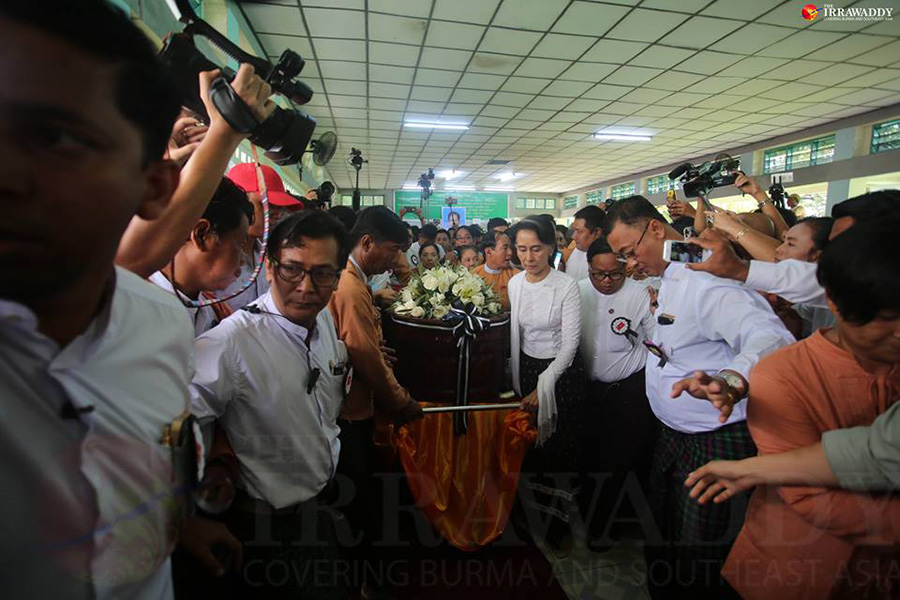
Aug. 13 — Former Brigadier General U Aung Shwe, one of the founders of the NLD and a former party chairman who took charge while Daw Aung San Suu Kyi and U Tin Oo were under house arrest in the 1990s and 2000s, died in Yangon at the age of 101.
Aug. 24 — The Parliament passed changes to sections of the controversial Telecommunications Law that had been used to stifle dissent.
The amendments require prosecutions using the law to be conducted directly by the “defamed” individual rather than a third party, unless the third party has been granted legal power by the individual. They also allow the defendant to receive bail.
The maximum prison sentence was cut from three years to two. However, the law’s most contentious clause — Article 66 (d) — remains in place.
Aug. 24 — The Kofi Annan-led Rakhine State Advisory Commission released its final report, which criticizes several aspects of Myanmar’s 1982 Citizenship Law as failing to meet international standards.
The report also encourages the government to accelerate the national verification process in Rakhine State in line with the Citizenship Law and create a transparent strategy and timeline for granting citizenship to those eligible.
The government said it would implement the report’s recommendations “within the shortest timeframe possible.”
However, Snr-Gen Min Aung Hlaing claimed that the commission’s report included some factual errors and questioned its partiality during his meeting with Mr. Annan.
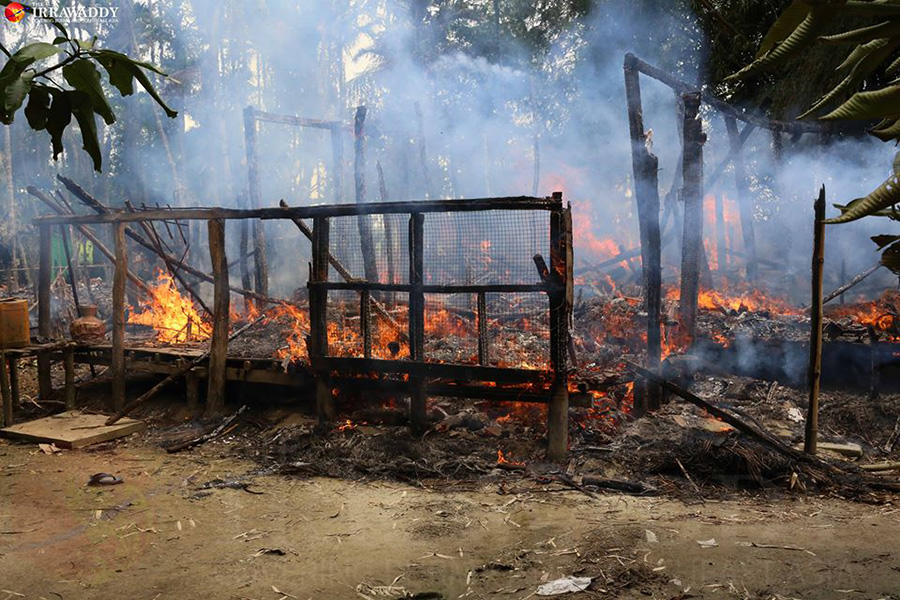
Aug. 25 — Within hours of the Rakhine State Advisory Commission report’s release, the Arakan Rohingya Salvation Army (ARSA) launched attacks on 30 police posts and an army base in the north of the state in which 10 police officers, one soldier and one immigration officer were killed.
The attacks prompted large-scale counter-insurgency operations by the Tatmadaw, with hundreds of Muslim militants and dozens of security personnel reportedly killed in the fighting that ensued.
The counter-insurgency operations triggered the mass exodus of more than 650,000 Rohingya Muslims to Bangladesh and brought on widespread allegations of extrajudicial killings, rape and other human rights violations by the military. Top UN and US officials have accused the military of ethnic cleansing.
September
Sept. 10 — A nationalist mob of approximately 400 people, some armed with swords and bamboo sticks, attacked a mosque and property owned by Muslims in Magwe Region’s Taungdwingyi Township. The mob was dispersed by police with rubber bullets and an attacker was arrested.
Sept. 19 — State Counselor Daw Aung San Suu Kyi delivered her first public address about the government’s position on the crisis in Rakhine State since violence flared up there on Aug. 25. She condemned any human rights violations and unlawful violence in the state, acknowledging that there had been “allegations and counter-allegations” of human rights abuses.
Daw Aung San Suu Kyi also cancelled her trip to the UN General Assembly in New York in order to concentrate on domestic issues.
Sept. 19 —Snr-Gen Min Aung Hlaing arrived in the Rakhine State capital of Sittwe for the first time since militant attacks on security forces in late August. His visit came amid international condemnation of the military’s response.
Sept. 20 — The Tatmadaw said it would never again send officers to Britain for training after the UK government announced it was suspending its training program with Myanmar’s military in light of government operations in Rakhine State dogged by allegations of human rights abuses against Rohingya.
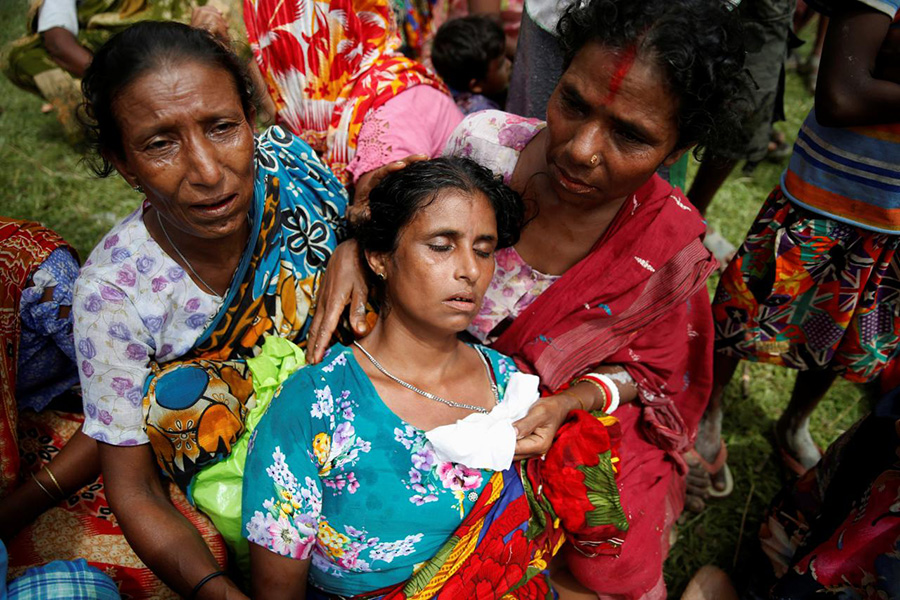
Sept. 25 — Security forces unearthed the corpses of 45 Hindus, including six children, near Ye Baw Kya village in northern Maungdaw Township, Rakhine State. In a statement, the government said members of ARSA abducted some 100 men and women from several Hindu villages in the Kha Maung Seik village tract on Aug. 25 and killed the majority of them.
October
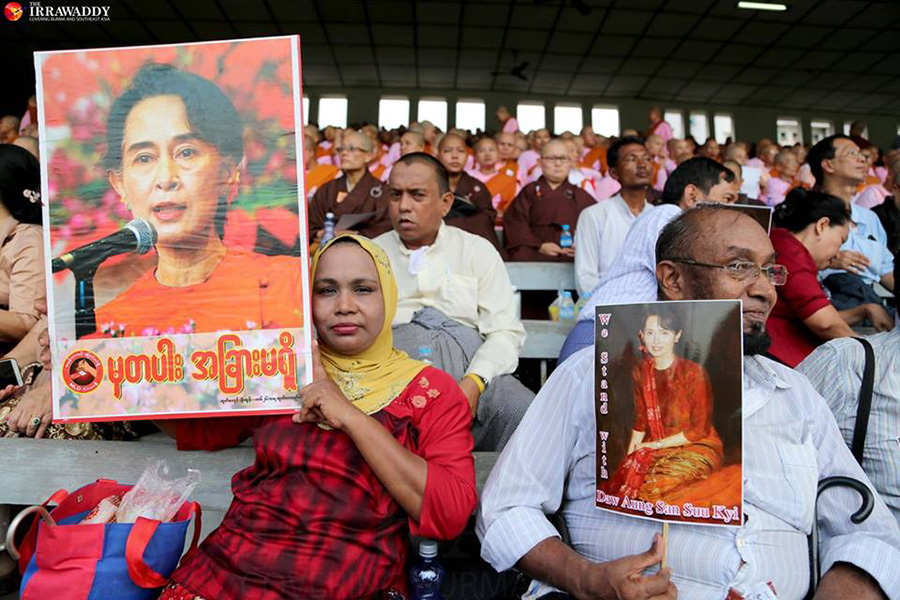
Oct. 10 — The country’s first mass interfaith rally with tens of thousands of participants was held at Yangon’s Aung San Stadium. Myanmar’s religious leaders called for peace and unity and improved relations between the followers of different faiths after an outbreak of deadly violence in August that inflamed communal tensions between Buddhists and Muslims.
Following the event, interfaith rallies were also held in other large cities across Myanmar.
Oct. 12 — State Counselor Daw Aung San Suu Kyi announced the establishment of the Union Enterprise for Humanitarian Assistance, Resettlement and Development in Rakhine. The enterprise, led by herself, was assigned three main tasks: repatriating and aid for those who fled to Bangladesh; the resettlement and rehabilitation of returnees regardless of their race and religion; and establishing peace and bringing development to the region.
Oct. 15 — Phyo Ko Ko Tint San, chairman of the ACE Company and son of the sports minister during the previous administration, U Tint San, was detained by police after guns and drugs were found in his backpacks at Naypyitaw Airport.
In the course of their investigation, authorities found another 20 firearms, bullets and drugs at his house, office and hotel in Yangon and Naypyitaw. Police arrested 15 people including Phyo Ko Ko Tint San who were then charged with illegal possession of firearms and other crimes under the State Secrets Act, Export and Import Law and Telecommunications Law, according to the Homes Affairs Ministry.
The military warned Daw Aung San Suu Kyi that she could be in danger.
Oct. 16 — The European Council said it and its member states would suspend invitations to Snr-Gen Min Aung Hlaing and other senior military officers. The council said it would also review all practical defense cooperation with Myanmar and consider additional measures if the situation in Rakhine State did not improve.
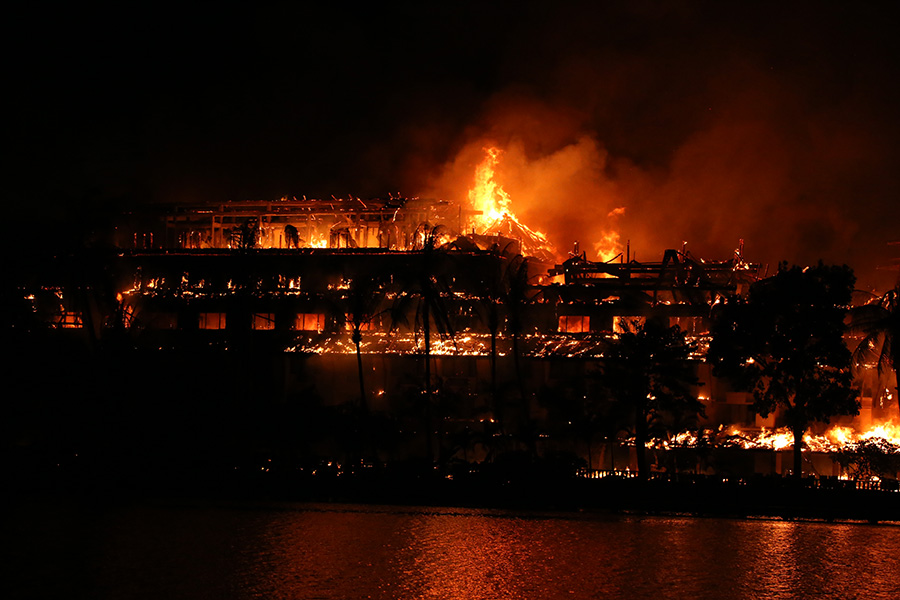
Oct. 19 — Two foreign tourists died in a massive blaze at the Kandawgyi Palace Hotel in Yangon. The blaze damaged about 80 percent of the teak building, which started out as the British Rangoon Rowing Club in 1934 and is now owned by tycoon U Tay Za. State-owned Myanmar Insurance paid 692 million kyats ($508,000) in compensation for losses.
October — The case of Khun Tan, who reportedly posed as the next Buddha in order to seduce young girls in Mon State’s Thaton Township, gained national attention.
The religious affairs minister said he was planning to take action against Khun Tan under Article 295 (A) of the Penal Code, which covers malicious acts “intended to outrage religious feelings” and carries a maximum prison sentence of two years.
Oct. 27 — Turkish state broadcaster TRT World producer Mok Choy Lin, from Malaysia, freelance camera operator Lau Hon Meng, from Singapore, and two Myanmar citizens — their interpreter Ko Aung Naing Soe and driver U Hla Tin — were detained for attempting to fly a drone near Myanmar’s Parliament in Naypyitaw and sentenced to two months in jail on Nov. 10 under the colonial-era Myanmar Aircraft Act for filming with a drone. They were also charged under the 2012 Export and Import Law for bringing the drone into the country illegally.
The two foreign journalists were also charged with violating Section 13 (1) of the Immigration Act on Nov. 27 for overstaying their visas, which expired while they were in custody.
Oct. 27— Lashio Township Court in northern Shan State sentenced two Kachin pastors— Dumdaw Nawng Latt, 65, and Langjaw Gam Seng, 35— to two and four years in prison, respectively, under three charges including unlawful association. They were arrested and charged for helping journalists visit the site of a church reportedly destroyed by rockets fired from a Myanmar Army fighter jet.
Oct. 31— Despite opposition from military representatives and opposition lawmakers, Myanmar’s national fiscal year was amended to run from October to September starting in 2018. The Union Parliament passed the presidential proposal.
November
November — Fighting between the Arakan Army and the Tatmadaw escalated in the first week of November, forcing more than 300 villagers to flee their homes in Paletwa, Chin State.
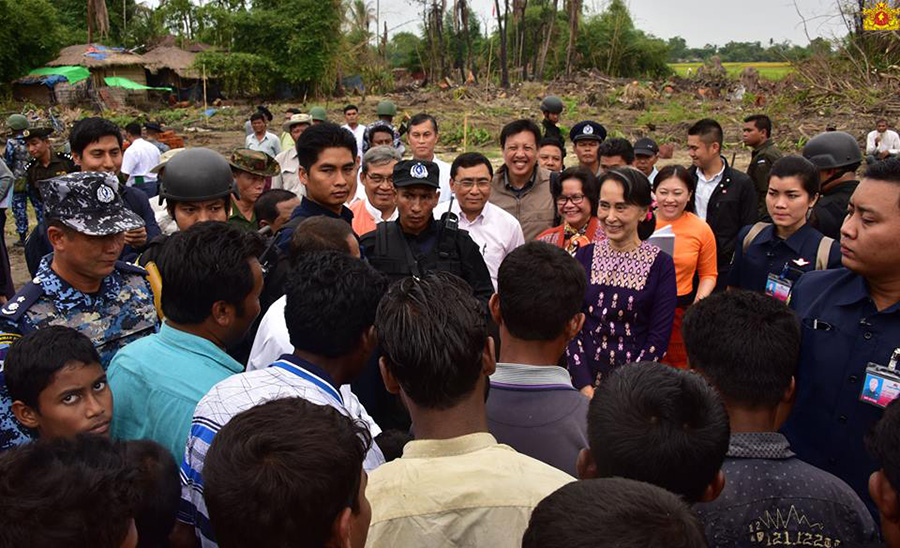
Nov. 2 —State Counselor Daw Aung San Suu Kyi flew to conflict-torn northern Rakhine State for the first time since the violence in late August. She met both Arakanese and Rohingya communities on an unannounced one-day visit to the region.
Nov. 6 — The United Nations Security Council issued a presidential statement calling on the Myanmar government to end the use of excessive military force and stop inter-communal violence in Rakhine State.
In the statement, the council also condemned ARSA’s Aug. 25 attacks on Myanmar security forces while strongly denouncing the violence and abuses during the military’s subsequent clearance operations that displaced the vast majority of Rohingya.
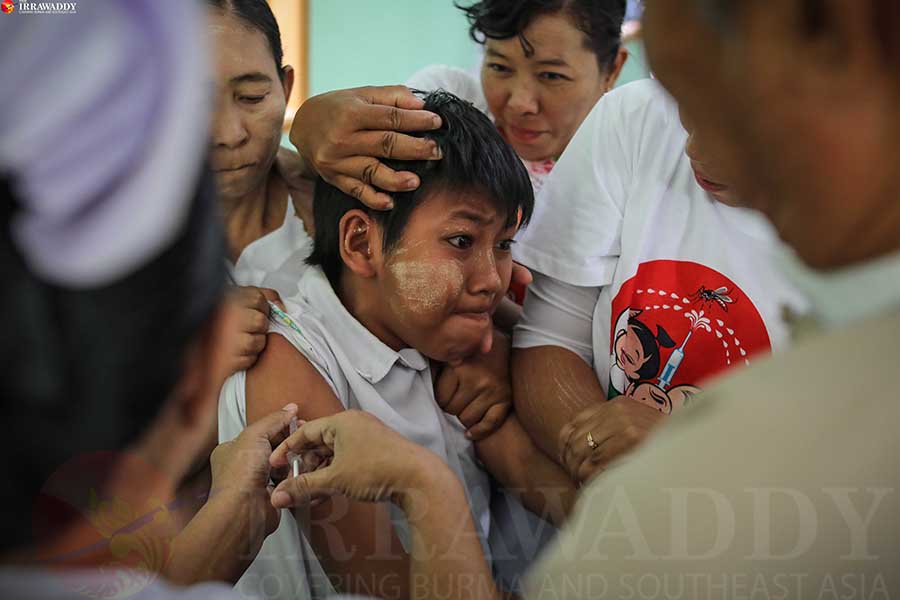
Nov. 15 — Marking one of the largest public health interventions ever conducted in Myanmar, a Japanese Encephalitis vaccination campaign got underway. The campaign targeted 14 million children aged nine months to 15 years old.

Nov. 15 — U.S. Secretary of State Rex Tillerson met with State Counselor Daw Aung San Suu Kyi and military chief Snr-Gen Min Aung Hlaing in Naypyitaw regarding the crisis in Rakhine State. During a joint press conference after Mr. Tillerson’s meetings with Daw Aung San Suu Kyi, they said the United States and friends around the region were committed to helping Myanmar and its people work through the crisis with urgency, sensitivity, and openness while remaining dedicated to the country’s successful transition to democracy.
After leaving Myanmar, Mr. Tillerson issued a statement calling the situation in Rakhine State “ethnic cleansing” and used the charged term “Rohingya,” which he avoided while in the country.
Nov. 17 — Parliament approved a motion to reinstate the image of the late independence hero General Aung San on the country’s currency despite universal opposition from the Lower House’s military appointees.
Nov. 20 — President U Htin Kyaw proposed to Parliament to replace the existing commissioners of Myanmar’s anti-corruption body, which was formed under the previous administration. He proposed replacing Chairman U Mya Win with former Information Minister U Aung Kyi, who is currently in charge of the government’s peace commission and has served in the military and government for over 50 years.
Nov. 20 — President U Htin Kyaw proposed establishing two new government ministries in Parliament, a Government’s Office and a Ministry of International Cooperation, to be overseen by National Security Adviser U Thaung Tun and Deputy Foreign Minister U Kyaw Tin, respectively. The proposal was later approved.
Nov. 21 — Military chief Snr-Gen Min Aung Hlaing travelled to China for meetings with Chinese President Xi Jinping and other senior officials.
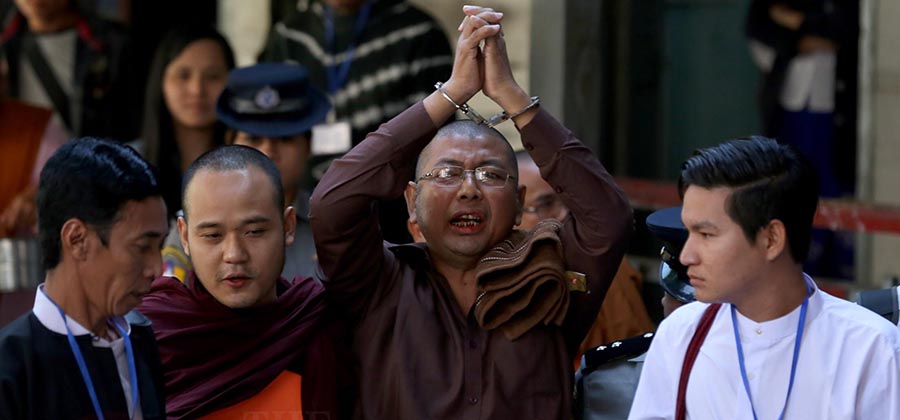
Nov. 21 — A court in Yangon’s Kamayut Township sentenced nationalist monk U Parmaukkha to one month in prison for violating the Peaceful Assembly Act last year for staging an unauthorized protest in front of the U.S. Embassy. He was also charged under Section 505 (b) of the Penal Code.
Nov. 23 — Amid mounting international pressure and concern over the crisis in Rakhine State, Myanmar reached an agreement with Bangladesh for the return of hundreds of thousands of Rohingya who fled to Bangladesh since the latest outbreak of violence in the state’s north in late August.
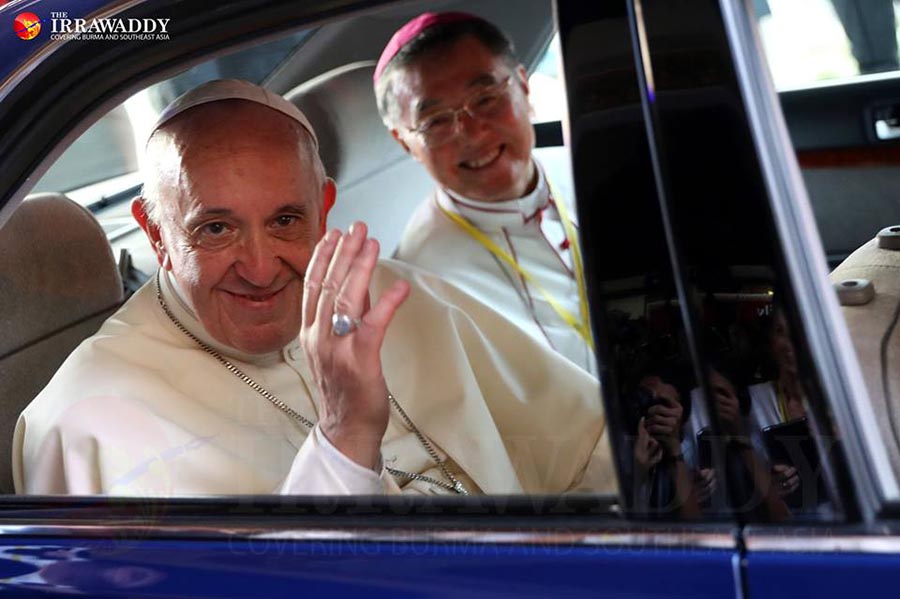
Nov. 27 — Pope Francis arrived in Myanmar for a four-day visit, becoming the first pontiff to visit the Buddhist-majority country where Christians make up less than 6.2 percent of the population. Coinciding with mounting international pressure on Myanmar over the crisis in Rakhine State, Francis studiously avoided the term “Rohingya” during his stay.
The pope received Snr-Gen Min Aung Hlaing in Yangon before meeting with President U Htin Kyaw and State Counselor Daw Aung San Suu Kyi the next day in Naypyitaw. The Vatican acknowledged that the order of the pope’s meetings breached protocol.
Nov. 27 — The government and eight ethnic armed organizations that signed the NCA agreed to convene the third session of the 21st Century Panglong Union Peace Conference during the last week of January.
Nov. 30 — State Counselor Daw Aung San Suu Kyi left for Beijing at the invitation of the Chinese government to deliver a speech “as a special guest” at a forum of world political leaders hosted by the Communist Party. It was the state counselor’s second trip to China in a year; she attended the Belt and Road Forum in Beijing in May.
December
Dec. 12 — Two Reuters journalists, Ko Wa Lone and Ko Kyaw Soe Oo, were detained in Yangon for allegedly violating Article 3 of the colonial-era Official Secrets Act.
Dec. 15 — After more than a year of testimony in the high-profile abuse case of two teenage maids, Yangon’s western district court sentenced four members of a family that owns the Ava Tailor Shop to 13 years in prison and up. They were convicted of torturing the girls and causing grievous harm. Two other family members were acquitted.
December — Fighting in Kachin State between the armed wing of the Kachin Independence Organization and the Myanmar Army intensified during the second and third weeks of December. The latest round of clashes erupted in late November, driving more villagers from their homes and deterring existing IDPs from returning home.
Dec. 19 — 88 Generation student activists registered a new political party, the Four Eights Party, with the Union Election Commission in Naypyitaw.
Dec. 19 — Ten unidentified bodies were found near a graveyard in Inn Din village in southern Maungdaw Township, Rakhine State.
Dec. 20 —The Myanmar government banned U.N. Special Rapporteur Yanghee Lee from returning to the country and informed the United Nations that it would not cooperate with her for the duration of her term. The government accused her of being biased.

Dec. 21 — The United States imposed sanctions on Maj-Gen Maung Maung Soe for overseeing military operations in Rakhine State responsible for widespread human rights abuse against Rohingya civilians.
The Tatmadaw had already removed him as head of its Western Command, responsible for Rakhine State, without explanation the previous month. He was replaced by Supply and Transport Directorate chief Brigadier General Soe Tint Naing.

















